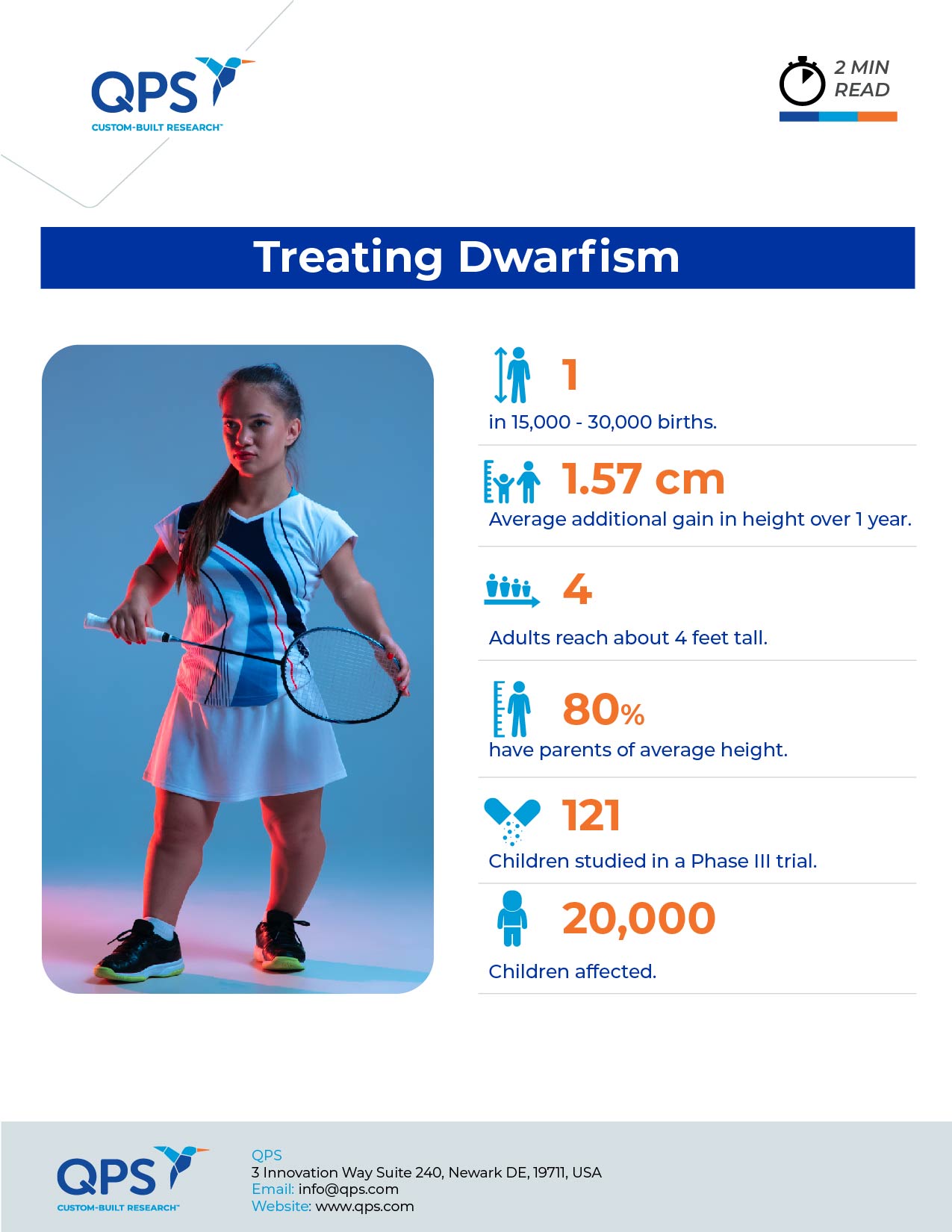The first drug to counter the genetic mutation that causes achondroplasia, the most common form of dwarfism, received accelerated FDA approval in November. BioMarin Pharmaceutical’s Voxzogo™ (vosoritide), a daily injection, was approved for children aged five and older.
A one-year phase 3 study of 121 children found that those who received the drug grew an average 1.57 cm taller compared to those who received a placebo. Following the initial study period, 58 participants who had been randomly assigned to receive Voxzogo were enrolled in an open-label extension study. Among those with two years of follow-up after randomization, the improvement in growth was maintained. Side effects included injection site reactions, vomiting and a temporary drop in blood pressure. The treatment can continue until a child’s growth plates have closed, typically around age 18.
Accelerated approval speeds up the process for drugs targeting serious conditions with limited treatment options. As a condition of the approval, BioMarin must conduct a post-marketing study to assess final adult height among participants. The company plans to fulfill the requirement with ongoing open-label extension studies. Voxzogo received approval from the European Commission in August and is under review in Japan, Brazil and Australia.
Rare Disease Target
Achondroplasia is a rare genetic bone growth disorder that causes severely short stature and disproportionate growth. It affects an estimated 21,000 children worldwide at a rate of between one in 15,000 to one in 35,000 births. Eighty percent of babies born with the condition have parents of average height. Adults with achondroplasia reach an average height of approximately four feet. In addition to disproportionate short stature and larger-than-usual head size, people with the condition can experience complications including:
- Spinal irregularities
- Bowed legs
- Sleep apnea
- Upper airway obstruction
- Obesity
- Hearing loss
- Dental problems
Genetic Intervention
People with achondroplasia have a genetic mutation that causes fibroblast growth factor receptor 3 (FGFR3), a growth regulation gene, to be overactive. This disrupts the normal process by which cartilage turns into bone, limiting growth. Voxzogo works by binding to a receptor called natriuretic peptide receptor-B, reducing the gene’s activity.
Voxzogo is the first to market, but a number of potential competitors are in development. Ascendis Pharma has a C-type natriuretic peptide drug in a phase 2 clinical trial. Pfizer and QED Therapeutics, a subsidiary of BridgeBio, both have drugs in phase 2 trials that aim to inhibit FGFR3 activity. Tyra Biosciences has a small molecule inhibitor of FGFR3 in the discovery stage.
Growth Medicine
Despite its promise, Voxzogo is creating some controversy, even among people it’s meant to treat. In a statement on its website, the advocacy organization Little People of America notes its concern that “a pharmaceutical intervention focusing on growth velocity is not addressing the actual health and quality of life issues of people with dwarfism.” The organization notes that it supports medical research to improve its members’ quality of life and respects each individual’s and family’s choices regarding healthcare decisions.
Still, Voxzogo represents a welcome treatment option for many families. A BioMarin press release announcing the approval quoted Amer Haider, parent and Co-Founder of Growing Stronger, an organization that raises nonprofit donations to support research focused on dwarfism. “We applaud the FDA for recognizing the urgent unmet medical need for this progressive condition. As a parent of a child with achondroplasia, I see the availability of treatments that impact bone growth as an important step forward,” Haider said. In the meantime, research will continue to determine if Voxzogo and similar drugs can prevent the medical complications of achondroplasia.
Did you enjoy this blog post? Check out our other blog posts as well as related topics on our Webinar page.
QPS is a GLP- and GCP-compliant contract research organization (CRO) delivering the highest grade of discovery, preclinical and clinical drug research development services. Since 1995, it has grown from a tiny bioanalysis shop to a full-service CRO with 1,100+ employees in the U.S., Europe and Asia. Today, QPS offers expanded pharmaceutical contract R&D services with special expertise in neuropharmacology, DMPK, toxicology, bioanalysis, translational medicine and clinical development. An award-winning leader focused on bioanalytics and clinical trials, QPS is known for proven quality standards, technical expertise, a flexible approach to research, client satisfaction and turnkey laboratories and facilities. Through continual enhancements in capacities and resources, QPS stands tall in its commitment to delivering superior quality, skilled performance and trusted service to its valued customers. For more information, visit www.qps.com or email info@qps.com.








